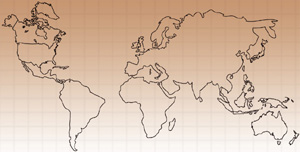|
Home >
Government >
Global Communications
|

|
|||||||||||||||
The Non-Negotiable Demands of Human Dignity
"No nation owns these aspirations, and no nation is exempt from them. We have no intention of imposing our culture. But America will always stand firm for the non-negotiable demands of human dignity."
Rule of Law
Equal Justice
Respect for Women
Freedom of Speech
Religious Tolerance
Private Property
"All fathers and mothers, in all societies, want their children to be educated, and live free from poverty and violence."
President George W. Bush
January 29, 2002
In his State of the Union address, President George W. Bush committed to "stand firm" for the seven non-negotiable demands of human dignity, and promote education and environments free from poverty and violence.
Global Listening Tours are key opportunities to communicate these values to a country's opinion leaders, professionals, students and religious leaders. They are values common to humanity and are likely to foster a greater understanding of the United States' global interests and concerns. We encourage U.S. government representatives to promote and expound upon the non-negotiable demands of human dignity within the prepared remarks and question and answer period of the Global Listening Tour event. These non-negotiable demands are amplified below:
Limited Government Power: A free and democratic system of governance that exists solely to promote and protect the best interests and well being of all its citizens. Thomas Jefferson wrote, "The government that governs least, governs best." Citizens should have the means to keep government power in check. And governments should only undertake those functions that cannot be accomplished by the efforts of its citizens. A limited state government grants more freedom and responsibility to local governments, neighborhoods and individuals to solve society's problems.
Rule of Law: The United States supports nations that govern based upon fair and just laws rather than the dictates of political or military leaders. Fair laws constrain the state's power and potential to abuse, discourage corruption, and protect human rights and political freedoms. Yet, citizens must have the ability to insist that their government abide by its established laws. Nations favored by the United States uphold transparent legal systems and the sanctity of laws and contracts.
Equal Justice: An impartial judicial system that treats people equally under the law without regard to their ethnicity, gender or socio-economic status.
Respect for Women: When women are granted equal status and protection under the law and equal access to education and economic opportunities, entire families and communities benefit. A just society protects a woman's rights to determine her future, freely express herself and have equal access to economic prospects and education.
Freedom of Speech: The freedom to publicly and privately express all opinions is a key component of a progressive society. A free press and free marketplace of ideas often exposes corruption and fosters progress.
Religious Tolerance: "America values and welcomes peaceful people of all faiths," said President Bush. The United States affirms nations that provide an environment in which all people have the freedom to peacefully worship according to their conscience.
Private Property: The basic human right to own property has been defended since America's founding. Countries experience economic growth when economic policies and laws encourage private ownership. It is well documented that free markets produce growth in the economic sector. President Bush has said, "Sound economic policies unleash the enterprise and creativity necessary for development."
Education: As President Bush has said "literacy and learning are the foundation of democracy and development."
Education gives people the means make informed decisions about their lives and contribute to society. Trained, informed minds are less likely to fall prey to the propaganda of terrorist groups or militias. Education enables countries to build a competitive workforce that can attract foreign investment and contribute to a country's long-term economic and social stability.
A Poverty- and Violence-Free Environment: "All are diminished when any are hopeless," said President Bush. "By helping the developing nations of the world, we offer an alternative to resentment and conflict and terror." The United States is establishing poverty- and violence-free environments by defending global security against terror, promoting international trade and reforming monetary and fiscal policies to encourage economic growth. Good governance overall will lead to a peaceful environment full of economic opportunity for the world's people.
"[People] can live in a world where their children's dreams are ignited by liberty and learning, not undermined by poverty and disease. They can live under governments that deliver basic service and protect basic rights. The demands of human dignity know no borders and know no boundaries. They are universal."
President George W. Bush
March 14, 2002
![]()
|
President
|
Vice President
|
First Lady
|
Mrs. Cheney
|
News & Policies
|
|


